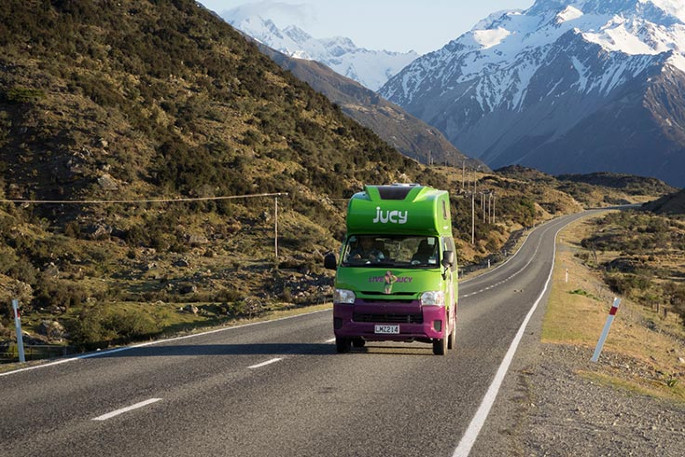A critical part of New Zealand’s tourism infrastructure will take over two years to rebuild to pre-Covid levels, according to an industry expert.
CEO of Jucy Dan Alpe says global shortages of new cars and industry rationalisation will leave the country’s rental inventory at around 30-40 per cent of what it was before the pandemic and will see rental prices rise in the short term.
Dan says their rental business was hit hard during COVID – with revenues dropping more than 95 per cent overnight.
He says many rental operators sold off the majority of their fleet at a time when supply chain shortages increased the resale value of second hand vehicles.
“The asset rationalisation we have seen in the vehicle rental industry provided a lifeline for some of the larger players, however some of the second and third tier companies have exited an unsustainable market.
“As a result when we open our doors to international tourists next month, New Zealand will be missing a critical part of our infrastructure.
“Replenishing this fleet will take us at least two years and in the interim we can expect prices to rise,” he says.

Jucy CEO Dan Alpe.
Dan says while some large industry players also sold their campervans into the domestic market, Jucy’s camper inventory remains unaffected, with most of their fleet placed into temporary storage.
He says their experience operating in the Australian market when it reopened for tourists last month has also provided several insights.
“Our Australian operation had around three weeks' notice before the borders reopened in February – similar to what NZ tourism businesses have had.
“What we have seen there was a significant government investment to incentivise aviation and bring capacity back in time for the tail end of their summer season.
“In addition, the Australian government was well organised and was able to roll out aggressive tactical tourism campaigns targeting, in the first instance, the working holiday market with great effect.
“This meant that there was no gradual build and leisure travel has bounced back straight away.
“The immediate response from the market was much quicker than expected and we have taken that learning on board and begun to scale up our New Zealand call centre already.
“Our bookings in Australia are showing strong demand for April and May and it is our expectation that NZ will have a similar response – assuming airline capacity can match demand,” he says.
Dan says the average daily rate for car hire in Australia has increased by 95 per cent – reflecting the shortage of car hire supply and their bookings for March are at 115 per cent of 2019 volumes for the same month.
He says with Australian school holidays coming, self-drive tourism numbers are set to be strong for the South Island.
“Tourism operators around the country will be taking a leap of faith at the moment – investing in staffing and equipment resources at a time where their cashflow has been strained to the limit – the challenge at this point is that the revenue won’t hit their accounts until the visitors arrive,” he says.
Dan says around 25 per cent of their current bookings have been speculative, with international tourists planning trips to New Zealand even prior to any border announcements.
He says New Zealand needs a balanced tourist market, including those on a working holiday which provide relief for the tight labour market.
“What we are expecting to see is a number of working holiday visitors among the first arrivals here when the border reopens, many of whom will enter seasonal working environments.
“Our European distributors tell us interest in New Zealand remains strong, however we don't expect to get high volumes of long haul Northern Hemisphere travellers arriving until October onwards,” he says.



